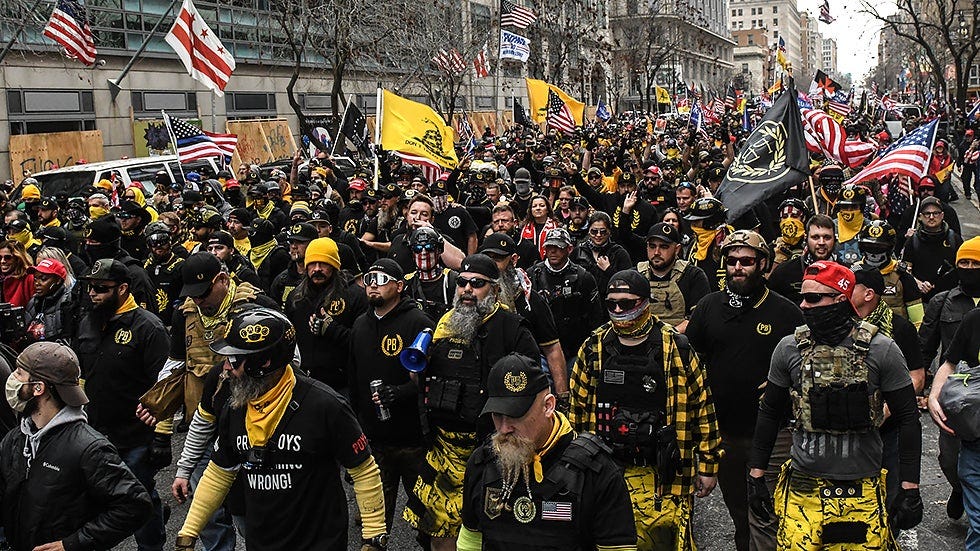Destabilized Saturday Edition #26
An assessment of the dehumanization phase, the JR-15 (for kids), schools' decades of lies, and how to beat the heat in Texas
I’m in the middle of historian Timothy Snyder’s 2017 bestselling (audio) book, On Tyranny, a short, bracing how-to guide on resisting authoritarianism. I will write more on this at some point, but for now I wanted to share an excerpt from chapter 6, Be wary of paramilitaries, that I found unnerving if not surprising:
Most governments, most of the time seek to monopolize violence. If only the government can legitimately use force, and this use is constrained by law, then the forms of politics that we take for granted become possible. It is impossible to carry out democratic elections, try cases at court, design and enforce laws, or indeed manage any of the other quiet business of government, when agencies beyond the state also have access to violence. For just this reason, people in parties who wish to undermine democracy and the rule of law, create and fund violent organizations that involve themselves in politics. Such groups can take the form of a paramilitary wing of a political party, the personal bodyguard of a particular politician, or apparently spontaneous citizens initiatives, which usually turn out to have been organized by a party or its leader. Armed groups first degrade a political order, and then transform it.
I’m listening to Snyder (who reads his own audio book) in an alarming democratic moment, of course. Consider:
This week former Oath Keepers spokesman, Jason Van Tatenhove, said to the January 6th committee of the group’s plan that day, “what it was gonna be was an armed revolution.”
In 2020, the Proud Boys were increasingly associating themselves with then-President Trump. The Armed Conflict Location & Event Data Project documented that 97 of the 152 demonstration events the group took part in that year were explicitly in support of Trump.
As the Washington Post recounts, “Proud Boys were present [on January 6th] when the first barrier was overturned to allow access to the secure area [in the Capitol], and a member of the group allegedly broke the first window on the building’s west side through which the initial breach occurred. …There have been indications for some time that the Proud Boys were in contact with the White House in the post-election period.”
On January 6th, longtime Republican political consultant and Trump advisor, Roger Stone, was guarded by two Oath Keepers who are now under indictment for seditious conspiracy. The January 6th committee revealed this week, via a grainy but unmistakable cell phone video, that Stone has taken the Oath Keepers “fraternity creed,” the first step toward membership.
In this week’s Interesting Reads article below, political violence scholar Rachel Kleinfeld offers a wider angle on the evolving relationship between militias and the Republican Party: “For the last few years, we’ve seen an uptick in Republican parties at the local level — though occasionally at the state level — using militias for security at party events, having militias vote on party business, in one case in Michigan having militias introduce legislation. You’re seeing a lot of photo-ops with militia members — things that normalize their interaction with the democratic process.”
And, of course, the in the U.S. there is such easy access to assault rifles and body armor that police are often outgunned and overpowered by mass killers. This was true both in Buffalo, where the shooter killed the off duty police officer whose multiple shots at him bounced off his body armor, and in Uvalde, where police so feared the shooter’s killing capacity they failed to act for 77 unimaginable minutes.
One thing worth saying here is it’s important the people involved in the attack on our government on January 6th, 2021, go to prison, both those who physically attacked the Capitol building and those involved in the planning. It’s essential for reasons of simple justice, but also crucial for making potential future coup plotters think twice.
To Snyder’s point about state control over most violence, deployed (at least in theory) in a way constrained by law, the current reality is that far from having a monopoly, all levels of government in the United States are now operating in a highly competitive violence market.
Most importantly, as militias become more integrated into Republican Party activity, history is clear that our country is moving further down the road toward a place we *really* don’t want to end up.
My Work
An optimistic and a pessimistic perspective on the politics of overturning Roe v. Wade
One way to view the reversal of Roe v. Wade is as a test of what happens when one Republican policy position – opposition to abortion in all or nearly all cases – becomes the law of the land in many states. What political impact will this sudden shift have?
Interesting Reads
An expert in political violence urgently warns: The worst is coming
“One of the things we know about other countries that descend into greater political violence is that violence is preceded by a dehumanization phase. America is well along in that phase: things like misogyny, racial epithets, calling Democrats “groomers” and comparing them to pedophiles.”
“We know from other countries that have descended into really serious political violence that this is a trajectory, and we’re on it. We’re actually pretty far advanced on it.”
Tweets of the Week



Extreme Weather Watch



Creeping Authoritarianism Watch










